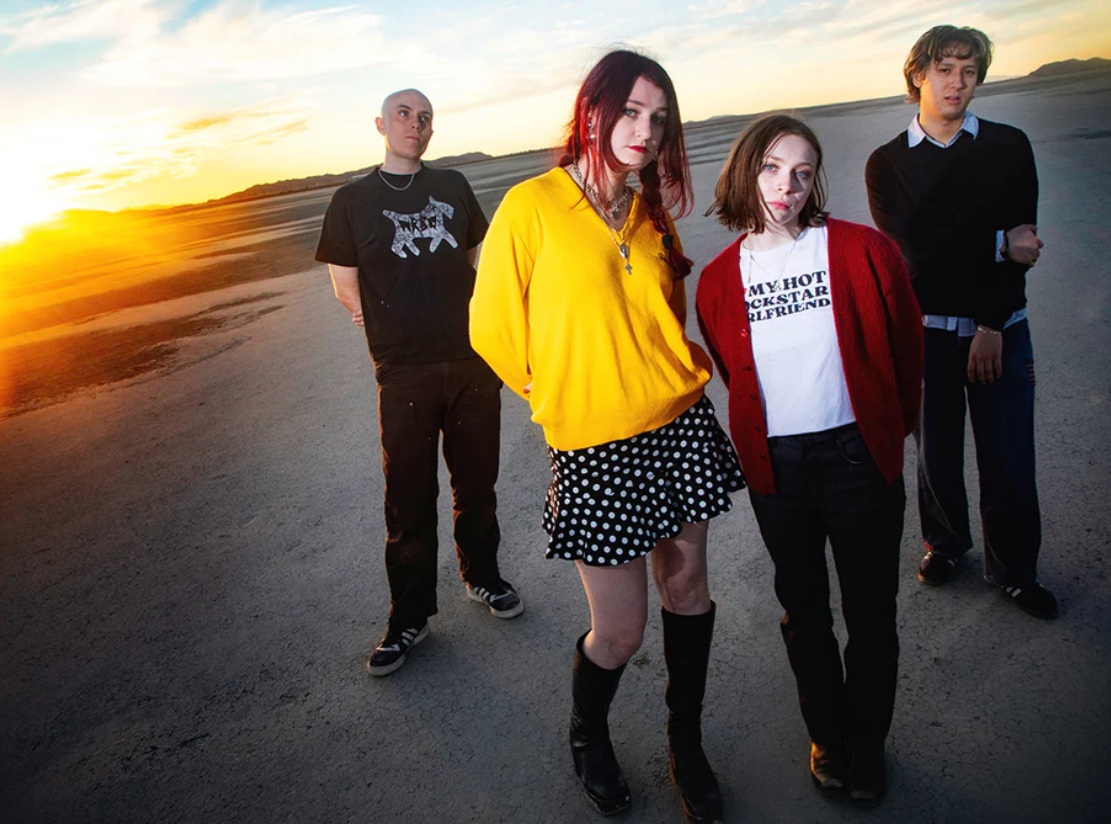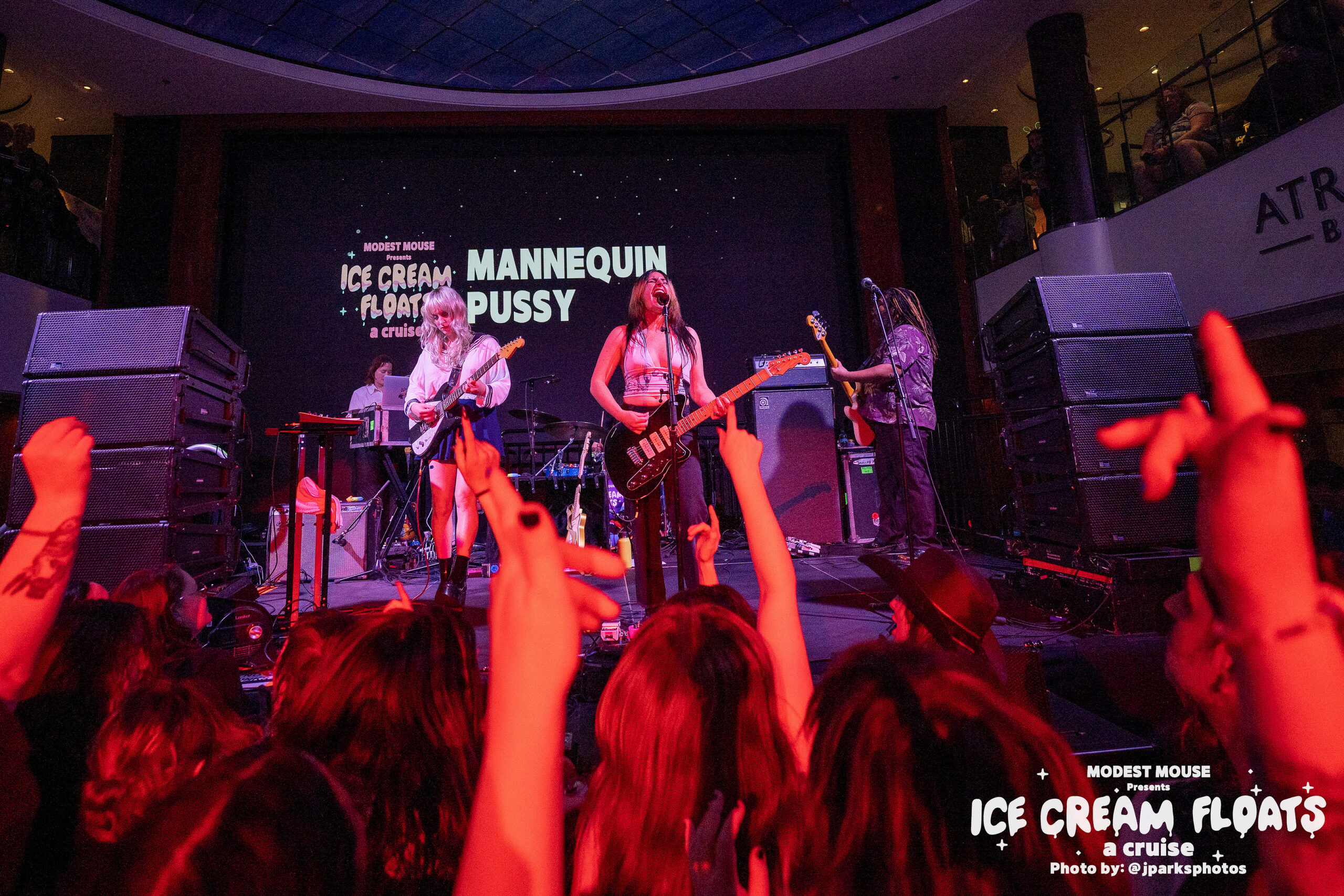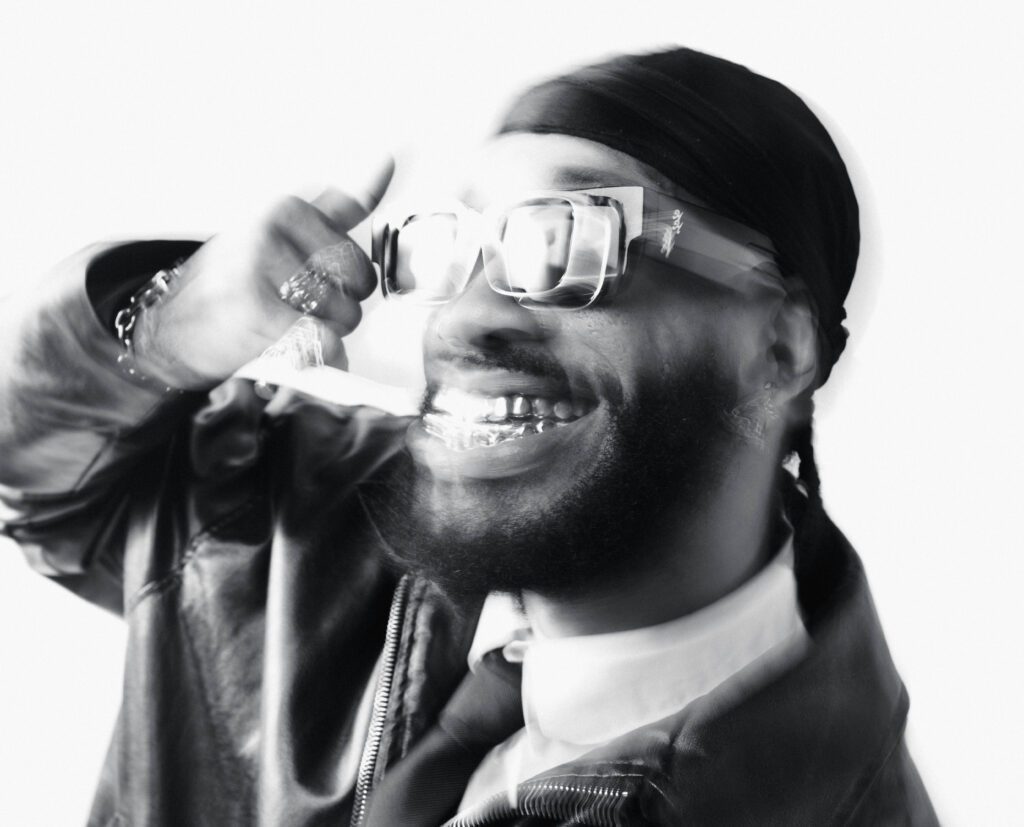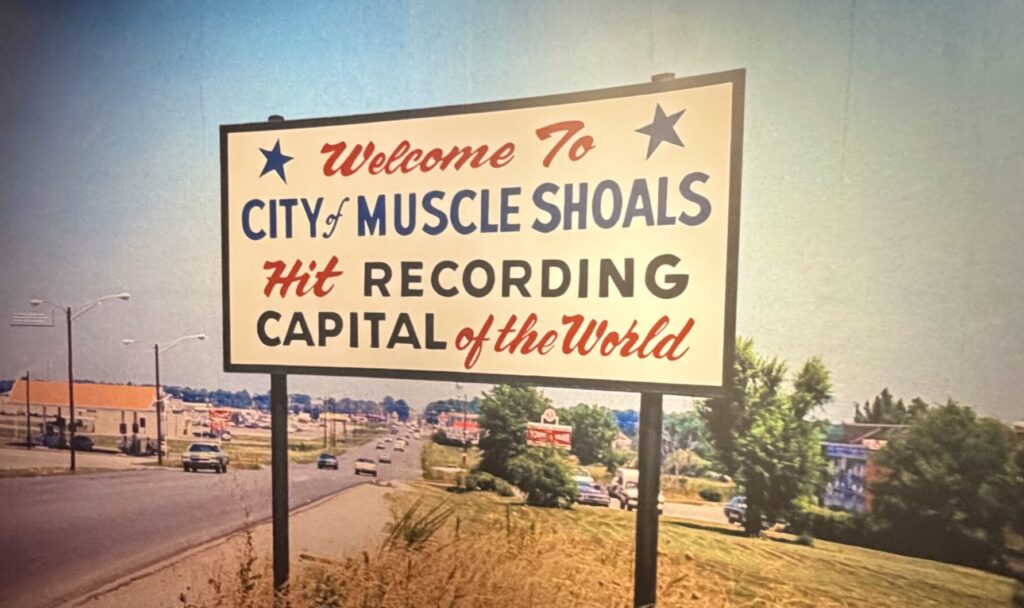The alt/indie rock band Momma is co-fronted by singers, songwriters and guitarists Allegra Weingarten and Etta Friedman, who sat down to chat with WNXP between a couple legs touring the country this year. In the spring, the band’s fourth album, Welcome to My Blue Sky, was released to critical acclaim.
Here is the creative duo core of the band Momma, On The Record with WNXP.
Touring
Celia Gregory: Looking at your tour page I can only imagine what it’s like as an aggressive schedule. But this is not your first rodeo, as it were, I know you’ve toured pretty incessantly. How’s it feeling right now since the release of this album in the Spring?
Allegra Weingarten: We had a really busy tour in the beginning of the spring, like April, May, and that was really, really exhausting. And emotionally taxing. But this tour has been very laid back. We’ve kind of learned our lessons and we were telling our agents, like, “Please go easy on us.”
Etta Friedman: Yeah, pretty much. Comparatively to the first run of this tour, this one has been super chill, really nice, also touring with people that we love.
CG: Especially in the Nashville audience, there are so many people that can relate to the grind that is touring, but a lot of people that just imagine it’s so fun. So when you say the emotional exhaustion of it, can you say more about that? Like it’s not just the physical on the body. How does it affect you mental health-wise and then performing, as well?
EF: Obviously there’s either outside things that happen sometimes that you can’t control that will seep in. Also, I mean, like we are all like family, but you know, sometimes being stuck in a van with the same people for two months, you might wanna just like isolate a little bit or maybe you’re just feeling something that the other person isn’t feeling that day. You know, it’s just like living with roommates, but like for 24/7.
CG: In a box with wheels.
AW: In a box with wheels, yeah. And then also like, I don’t know, you’re exhausted all the time too, because playing a show actually does really wear you out and it’s a lot of physical exertion. And then sometimes you don’t get to eat lunch because you’re driving all day and sometimes you get to sleep because you got to drive all day and that’s just hard.
CG: And turns out when you’re rocking out and expending calories, you probably need to nourish yourself with calories to be able to do that.
AW: Yeah, and sometimes you just are simply not able to.
CG: Deposits and withdrawals, right?
AW: Yes, exactly.
Reception of Welcome To My Blue Sky
CG: Welcome To My Blue Sky has so many individual songs that we’ve been able to play on the radio. I feel it’s the same as [2023 record] Household Name in that it’s no skips. I wonder how you’ve found fans responding to this and being able to watch so many people when you’re on tour singing songs back to you. Any reflections now that it’s marinated for half a year?
AW: It’s always surprising to see people sing along – even though that’s the goal, you never expect it. There’s this feeling of like, “Oh my god, I wrote this song in my bedroom in, like, a really vulnerable time of our lives. And now it doesn’t belong to us anymore.” And that’s, like… not bittersweet, but it’s really awesome and exciting. And then it’s also like, “Whoa, this is real. Everyone knows what I was thinking at that time.” But it’s still fairly new, as well. We’re pretty new into the album cycle, so we’re definitely getting a lot of people that are coming up to us being like, “Household Name is my favorite record of all time. The new one’s good, too.” And it’s like, OK, people need to get used to things, I think. I think it takes longer for people to really start to fall in love with something.
EF: Totally. And, not to pat ourselves on the back too much, but I think we did a good job, like you know, still growing and exploring our sound, but having something like universally Momma about it. Because Household Name was kind of like the thing that introduced a lot of people to us, I think that that’s where they will associate our sound always. So I think maybe to some this record could be a bit surprising in certain ways. And then I think to some, it’s maybe really scratching the itch.
Songs that musically stretched them
CG: I wanted to ask you about a specific track where maybe you felt like in- studio, and maybe even playing it, was a different direction for you. And it was an intentional one, but it was vulnerable musically because it was different than Household Name. Is there a song you can sort of extrapolate that idea on?
AW: Probably “Take Me With You” is the most different. I don’t know, I kind of had that feeling when we were doing “Stay All Summer,” just because it was really sending it far in the other direction of like, OK, we’re kind of committing to the fact that this is a pop song and not that it’s so out of our realm. But I was kind of insecure that people would be like, “Oh, sellouts” or something.
EF: Yeah, well and then “Bottle Blonde” is also so different and that’s been interesting to adapt into a live setting because it just uses so many things that Aaron was programming that can’t necessarily like fully be replicated live. So it’s been fun trying to figure out how to play it with the same feeling, I guess.
Lessons learned while leveling up
Can you share anything that, maybe touring so far this year, you’ve learned working with so many different people on the road? So maybe not just your creative community at home, but being around different types of creatives when touring with that overlap that you get.
EF: I think my personal biggest lesson was when we were supporting other bands and like legacy bands, too, bands who’ve been doing it forever. And also supporting newer acts. There can be a big difference between the two just because of how long they’ve either been working or like the come-up of their music generally. I think it creates a really different type of work environment that you step into, which is really interesting. And I think that ultimately working with a bunch of people who were watching how their crew moves around and how they conduct themselves in regards to either the support or like their shows or whatever, I think you can kind of glean a lot off of that. Like this is our first tour where we’re like traveling with crew at all. So it’s been cool to put that into action, like take things that we’ve learned that we like.
AW: I feel like we’ve also learned a lot just from going and seeing other bands. Like, it’s easy when you scale up your production to want to make everything perfect. We just started using in-ears. So it’s really easy to get carried away and be like, “Yeah, every single song we need to have a click track so we’re playing the same BPM every single night and we have a million tracks and like, blah, blah, blah.” And I feel we’ve gone to live shows that are like that and looked at each other and been like, “You can kind of tell that this is lacking a little bit of soul.” Or, like, spontaneity. So that’s something that we’ve really tried to balance between scaling up our production and feeling like every show, you’re still gonna get a different experience from us, whether it’s us, like, fucking up a song just because we’re human or adding a song on the fly because someone requested it. Just being like flexible like that.
EF: Yeah, and I think like that’s something we really appreciate about a live show, generally — like being in the audience or playing it, too. It’s way more fun that way.
It’s about cheating
CG: I’m not a gotcha journalist, but because you’ve been on the record about it before, I’ve understood that the through-line to some of these songs as co-songwriters on the record is infidelity. Experiences that you weren’t sharing with each other maybe at the time, but then it came through in the music and so it almost makes it sort of cohesive. You said sharing these feelings vulnerably with fans and seeing them sing it back, you’re like, “Oh God, they know.” What about sharing that with one another made the creation of this record different than past work that you’ve done? Also gelling together the longer you play together.
AW: This record, almost every single song we wrote together, or at least started with the two of us. On Household Name, we had more songs that were like Etta songs or Allegra songs and this record was more 50-50 in that way. So I feel like we’re each equally attached to every single song, not only because we’re talking about a personal topic that we both have in common, but just the fact that every single song, we both have a guitar part that we wrote that we feel really passionately about. Or, like, it’s just different when you’re there at the inception of a song, I feel like you remember, it feels like more sentimental or something.
EF: Yeah, totally. And I mean, a lot of like our songwriting process is having a conversation even before we start writing, like just trying to figure out what we are trying to say and what we want to say. And I think that that is also super necessary in terms of exploring this same topic from similar but different perspectives. I think that being able to be really open with each other is key.
AW: Even doing press like this, like, if we did solo projects, I don’t know how willing I would be to go and talk to an interviewer and be like, “Yeah, I cheated on my boyfriend.” That’s a lot scarier to do, but when you’re with someone that has your back and is like standing in your corner and vice versa, it just makes it a lot easier to not only write, but then stand behind it and be, “Yeah, totally. I back this part of my life and I don’t regret the decisions I made even though they might have been a mistake.”
EF: Yeah, and even without exploring all of that through music, just generally, emotionally exploring that, it’s really nice to just have another person. I feel like we wouldn’t have been able to like, or I should say, I wouldn’t be able to fully be as progressed in that situation as I am now if it wasn’t for Allegra and this record and being able to purge in that way. I think there was a lot of self-discovery for the both of us individually that then we were able to also like share with one another.
“Take Me With You”
AW: [“Take Me With You”] is a song that nobody asks us about. That was one of my favorite experiences from recording this record, just because we did it in one take together and we were really scared. But then we listened back to it and we’re like, “Oh.”
EF: We were like, “Oh, it’s not as bad as we thought it was going to be.” ‘Cause, yeah, it was a very much like trust the process thing…we’ve never done just like, OK, we’re going to sit in a room. We literally put lights [on], like we made it all moody and just kind of faced each other and played and sang it and did just a few takes. So that was in New York and we were cutting the other half of the record in LA and before even going to LA, I was like, “Should we just, without our voices, should just try to record just that? I’m so nervous about how this is gonna turn out and what if that track is just then, we can’t do anything with it?” And Aaron was like, “It’s gonna be fine, it’s going to be fine.” And it was great. And he added the double bass. He added some stuff at the end that just made it really, I don’t know. It’s one of my favorite songs on the record.
Life off the road
CG: When you feel rooted at home, what does that feel like? What does it look like? Unless it’s time for rehearsals for a new tour, or recording, when it’s off between those things how are you communing? And how are you, I don’t know, getting that alone time that you need?
AW: I’ve just been like completely bed rotting. Like the second we got back from our last tour, I literally just was in bed all summer and I felt so guilty about it. And then the second I got back on this tour, I was like, “All I want to do is just be in bed and do nothing. So I don’t know. That’s important to me. And then I’ve also been going upstate a lot and jumping in a lake.
EF: Yeah, I see my girlfriend a lot who doesn’t live in the same state as me or us and so I’ll go there to relax. But if I’m in New York, I’ll pretty much be inside. I think it’s like we have too much socialization. You know what I’m saying?
CG: You mean as a human race or as a band?
EF: Oh, no, just like being a touring band. I think like you kind of have to be “on” a lot of the time. And it’s like, when you get a second to actually be in your own space, it’s really nice to just, like, shut it all off. I feel lucky because I’m definitely somebody who needs something to do, or else I feel nuts. Even if that’s like cleaning my room for the day, you know what I’m saying? So I feel fortunate ’cause the past few months I’ve been working on a project, like an art project. So that has been nice. And that’s all I’m doing.
CG: No idle hands, but also bed rotting. Permission to bed rot. These are trying times.
AW: It’s necessary. It’s so necessary.




